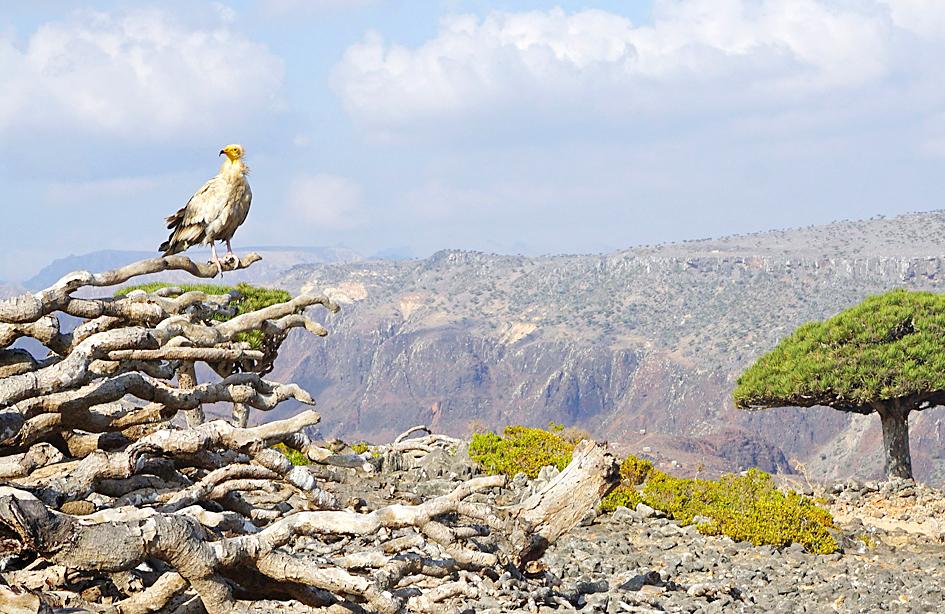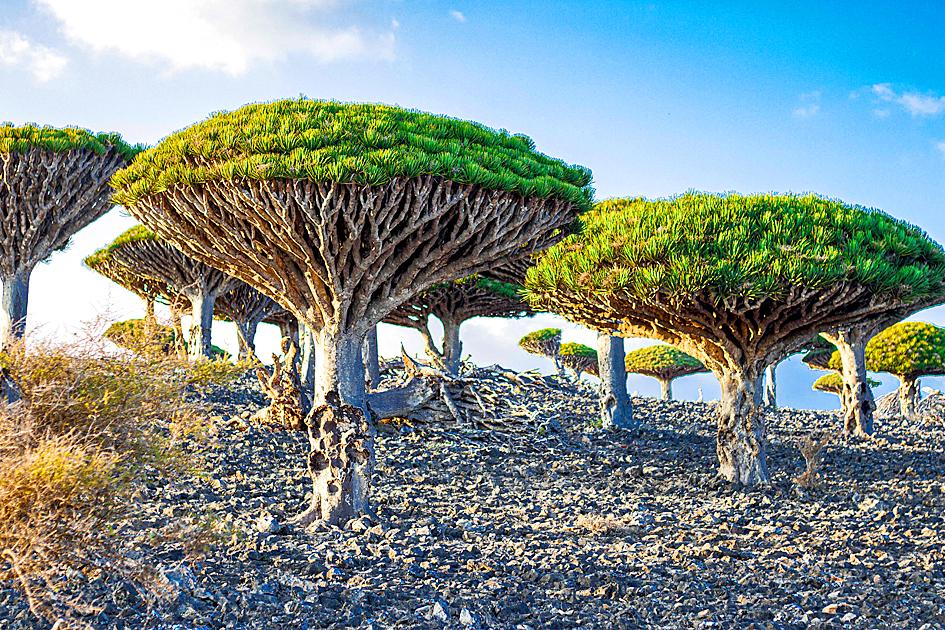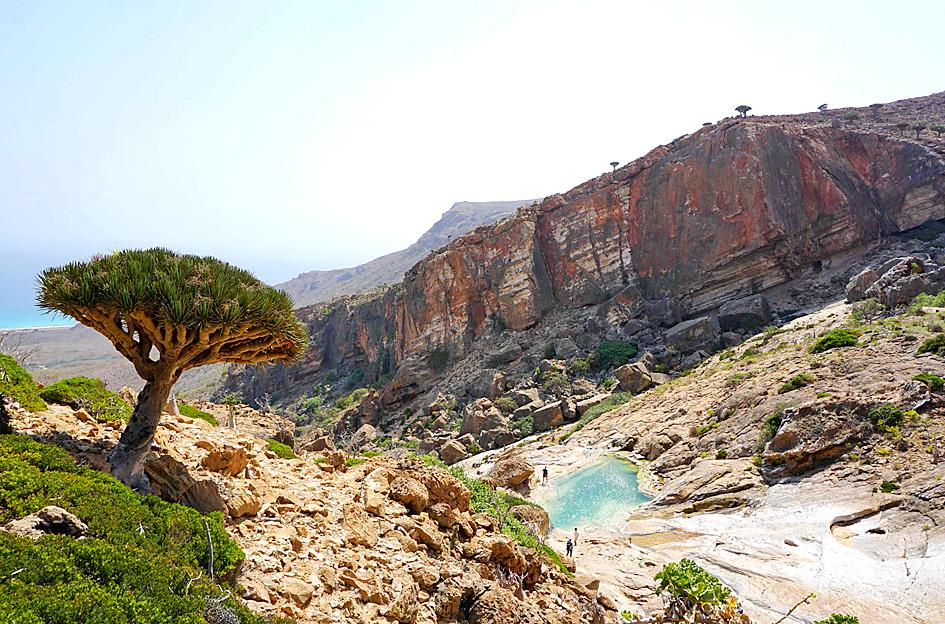Centuries-old umbrella-shaped dragon’s blood trees line the rugged peaks of Yemen’s Socotra, a symbol of the Indian Ocean archipelago’s extraordinary biodiversity, but also a bleak warning of environmental crisis.
Forests of these ancient trees are being destroyed by storms, while replacement saplings are gobbled by proliferating goat herds, leaving the fragile biological hotspot vulnerable to desertification.
“The trees bring water, so they are so important,” said Adnan Ahmed, a mathematics teacher and tour guide whose passion is Socotra’s flora and fauna. “Without trees, we will be in trouble.”

Photo: AFP
Lying in turquoise seas between Arabia and Africa about 350km south of Yemen’s coast, Socotra is home to more than 50,000 people and has remained relatively untouched by the bloodletting of the civil war raging on the mainland.
Naming it a World Heritage site in 2008, UNESCO described the main island as one of the world’s “most biodiversity rich and distinct.”
It has also been dubbed the “Galapagos of the Indian Ocean.”

Photo: AFP
Ahmed said that islanders traditionally do not fell dragon’s blood trees for firewood, because they perpetuate regular rainfall and because its blood-red sap is medicinal.
However, scientists and islanders warn that the trees will largely die out within decades, buckling under pressure from cyclones, as well as invasive species and overgrazing.
“Goats eat the seedlings, so young trees are only found on cliff faces in the most inaccessible places,” Ahmed said.

Photo: AFP
The trees take nearly half a century before they reproduce, he said.
“If nothing is done, it will not take long before all are gone,” he said.
The shrinking forests are a canary in the mine for Socotra’s environmental challenges, University of Ghent biologist Kay van Damme said.
“It remains a treasure trove of biodiversity, but we may soon be running out of time to protect Socotra’s most iconic flagship species,” said Van Damme, who chairs the Friends of Socotra support group.
Each lost tree drives a reduction in the hydrological cycle.
Islanders say that the trees have been battered by storms more ferocious than anyone remembers.
At Diksam, on the high plateau surrounding the Hagher mountains, running like a spine along the 130km island and 1,500m high, dead trees lie scattered like bowling ball pins.
Other local species are just as hard hit by storms and overgrazing, including the 10 endemic species of frankincense tree.
Gales have torn through nearly one-third of the trees in the Homhil forest over the past decade.
Without replanting efforts, the forest “will be gone in only a few decades,” Van Damme said.
One study found that the number of frankincense trees had plummeted by 78 percent in the area between 1956 and 2017.
“The immune system of Socotra is now compromised,” Van Damme said, but added: “There is still hope.”
Landslide scars caused by the loss of vegetation are now a common sight.
“If the trend continues, future generations might be able to visit a Socotran frankincense tree only in a botanical garden, accompanied by a little plaque saying: ‘Extinct in the wild,’” Van Damme said.
The International Union for Conservation of Nature said that Socotra is under “high threat,” and the “deteriorating” situation would be “accelerated by climate change.”
Islanders are already feeling the impact of changing weather patterns.
Abdullah Ahmed, from a small fishing village near Shuab, a cluster of solidly built coral-stone homes, said that the 40 residents were threatened by extreme high seas and landslides.
They have built a new village 10 minutes’ walk from the sea.
“Waves in the last storms smashed the windows of our home,” the 25-year-old said, describing how his family had sheltered in caves for days. “The last monsoon was worse than anyone had experienced.”
Some Socotris are doing what they can to protect their island.
Adnan Ahmed peered over the stone wall of a community-run dragon’s blood tree nursery, a soccer-pitch sized area enclosed against goat invasions.
Inside are dozens of knee-high saplings. Resembling pineapple plants, they are the painstaking result of at least 15 years’ growth.
“It is a start, but much more is needed,” he said. “We need support.”
Sadia Eissa Suliman was born and raised at the Detwah lagoon, listed as a wetland of global importance under the Ramsar wetlands convention.
“I saw how the lagoon was changing,” said the 61-year-old grandmother, who watched swathes of trees being chopped down, plastic being dumped and fishing nets trawling the water, a critical nursery for young fish.
“Everyone said someone else would do something, but I said: ‘Enough. I will do it, and people will see the difference,’” Suliman said.
She now helps the community enforce a fishing ban and raises funds to enclose trees and tackle littering.
Scientists are also determined that Socotra will not just become another case study of loss.
“We have a chance as humans to not mess this one up, otherwise we’ve learnt nothing from other examples of huge extinctions on islands,” Van Damme said. “Socotra is the only island in the entire world where no reptile, plant or bird that we know of has gone extinct in the last 100 years. We have to make sure it stays that way.”

POLITICAL PRISONERS VS DEPORTEES: Venezuela’s prosecutor’s office slammed the call by El Salvador’s leader, accusing him of crimes against humanity Salvadoran President Nayib Bukele on Sunday proposed carrying out a prisoner swap with Venezuela, suggesting he would exchange Venezuelan deportees from the US his government has kept imprisoned for what he called “political prisoners” in Venezuela. In a post on X, directed at Venezuelan President Nicolas Maduro, Bukele listed off a number of family members of high-level opposition figures in Venezuela, journalists and activists detained during the South American government’s electoral crackdown last year. “The only reason they are imprisoned is for having opposed you and your electoral fraud,” he wrote to Maduro. “However, I want to propose a humanitarian agreement that

ECONOMIC WORRIES: The ruling PAP faces voters amid concerns that the city-state faces the possibility of a recession and job losses amid Washington’s tariffs Singapore yesterday finalized contestants for its general election on Saturday next week, with the ruling People’s Action Party (PAP) fielding 32 new candidates in the biggest refresh of the party that has ruled the city-state since independence in 1965. The move follows a pledge by Singaporean Prime Minister Lawrence Wong (黃循財), who took office last year and assumed the PAP leadership, to “bring in new blood, new ideas and new energy” to steer the country of 6 million people. His latest shake-up beats that of predecessors Lee Hsien Loong (李顯龍) and Goh Chok Tong (吳作棟), who replaced 24 and 11 politicians respectively

Young women standing idly around a park in Tokyo’s west suggest that a giant statue of Godzilla is not the only attraction for a record number of foreign tourists. Their faces lit by the cold glow of their phones, the women lining Okubo Park are evidence that sex tourism has developed as a dark flipside to the bustling Kabukicho nightlife district. Increasing numbers of foreign men are flocking to the area after seeing videos on social media. One of the women said that the area near Kabukicho, where Godzilla rumbles and belches smoke atop a cinema, has become a “real

‘WATER WARFARE’: A Pakistani official called India’s suspension of a 65-year-old treaty on the sharing of waters from the Indus River ‘a cowardly, illegal move’ Pakistan yesterday canceled visas for Indian nationals, closed its airspace for all Indian-owned or operated airlines, and suspended all trade with India, including to and from any third country. The retaliatory measures follow India’s decision to suspend visas for Pakistani nationals in the aftermath of a deadly attack by shooters in Kashmir that killed 26 people, mostly tourists. The rare attack on civilians shocked and outraged India and prompted calls for action against their country’s archenemy, Pakistan. New Delhi did not publicly produce evidence connecting the attack to its neighbor, but said it had “cross-border” links to Pakistan. Pakistan denied any connection to